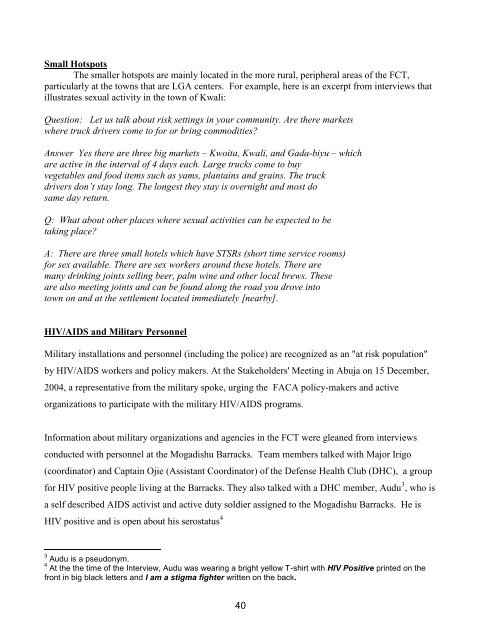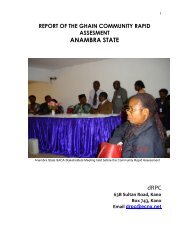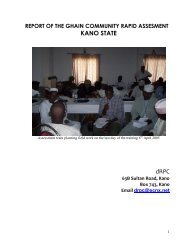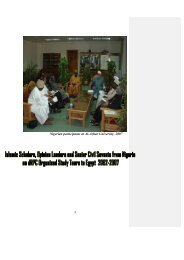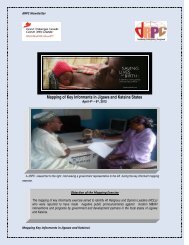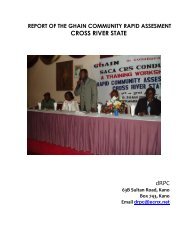Gate - the The development Research and Projects Centre (dRPC)
Gate - the The development Research and Projects Centre (dRPC)
Gate - the The development Research and Projects Centre (dRPC)
You also want an ePaper? Increase the reach of your titles
YUMPU automatically turns print PDFs into web optimized ePapers that Google loves.
Small Hotspots<br />
<strong>The</strong> smaller hotspots are mainly located in <strong>the</strong> more rural, peripheral areas of <strong>the</strong> FCT,<br />
particularly at <strong>the</strong> towns that are LGA centers. For example, here is an excerpt from interviews that<br />
illustrates sexual activity in <strong>the</strong> town of Kwali:<br />
Question: Let us talk about risk settings in your community. Are <strong>the</strong>re markets<br />
where truck drivers come to for or bring commodities?<br />
Answer Yes <strong>the</strong>re are three big markets – Kwoita, Kwali, <strong>and</strong> Gada-biyu – which<br />
are active in <strong>the</strong> interval of 4 days each. Large trucks come to buy<br />
vegetables <strong>and</strong> food items such as yams, plantains <strong>and</strong> grains. <strong>The</strong> truck<br />
drivers don’t stay long. <strong>The</strong> longest <strong>the</strong>y stay is overnight <strong>and</strong> most do<br />
same day return.<br />
Q: What about o<strong>the</strong>r places where sexual activities can be expected to be<br />
taking place?<br />
A: <strong>The</strong>re are three small hotels which have STSRs (short time service rooms)<br />
for sex available. <strong>The</strong>re are sex workers around <strong>the</strong>se hotels. <strong>The</strong>re are<br />
many drinking joints selling beer, palm wine <strong>and</strong> o<strong>the</strong>r local brews. <strong>The</strong>se<br />
are also meeting joints <strong>and</strong> can be found along <strong>the</strong> road you drove into<br />
town on <strong>and</strong> at <strong>the</strong> settlement located immediately [nearby].<br />
HIV/AIDS <strong>and</strong> Military Personnel<br />
Military installations <strong>and</strong> personnel (including <strong>the</strong> police) are recognized as an "at risk population"<br />
by HIV/AIDS workers <strong>and</strong> policy makers. At <strong>the</strong> Stakeholders' Meeting in Abuja on 15 December,<br />
2004, a representative from <strong>the</strong> military spoke, urging <strong>the</strong> FACA policy-makers <strong>and</strong> active<br />
organizations to participate with <strong>the</strong> military HIV/AIDS programs.<br />
Information about military organizations <strong>and</strong> agencies in <strong>the</strong> FCT were gleaned from interviews<br />
conducted with personnel at <strong>the</strong> Mogadishu Barracks. Team members talked with Major Irigo<br />
(coordinator) <strong>and</strong> Captain Ojie (Assistant Coordinator) of <strong>the</strong> Defense Health Club (DHC), a group<br />
for HIV positive people living at <strong>the</strong> Barracks. <strong>The</strong>y also talked with a DHC member, Audu 3 , who is<br />
a self described AIDS activist <strong>and</strong> active duty soldier assigned to <strong>the</strong> Mogadishu Barracks. He is<br />
HIV positive <strong>and</strong> is open about his serostatus 4<br />
3 Audu is a pseudonym.<br />
4 At <strong>the</strong> <strong>the</strong> time of <strong>the</strong> Interview, Audu was wearing a bright yellow T-shirt with HIV Positive printed on <strong>the</strong><br />
front in big black letters <strong>and</strong> I am a stigma fighter written on <strong>the</strong> back.<br />
40


